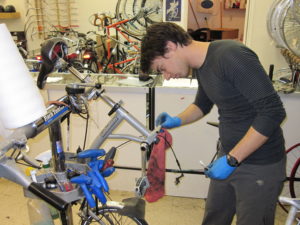 According to Genesis 2:15, God offered work to humanity as part of the good creation. Work becomes more difficult in Genesis chapter 3, but the curse on the earth does not make work on the earth any less a holy task. So while in Religious Studies I learned to delineate The Sacred and The Profane (Mircea Eliade), this night, with regard to work, we learned we need not have that division. Continue reading Spirituality of Work – Oblate Formation
According to Genesis 2:15, God offered work to humanity as part of the good creation. Work becomes more difficult in Genesis chapter 3, but the curse on the earth does not make work on the earth any less a holy task. So while in Religious Studies I learned to delineate The Sacred and The Profane (Mircea Eliade), this night, with regard to work, we learned we need not have that division. Continue reading Spirituality of Work – Oblate Formation
Category Archives: spiritual formation
5 Formation Lessons from Oblation
Nearing one year of Benedictine oblate candidate formation, here are five formation points I experienced which are useful to any spiritual formation, especially small groups.
 Set Goals
Set Goals
In order to enter oblate candidate formation, I completed an extensive application, which included goals to work on during my time in formation. Also, at the end of each class, each candidate added new goals or honed existing goals to greater specificity. Having goals provides a target and a way to check progress (2 Corinthians 5:9). As oblate candidates we each have individual goals, but as a group we choose to pursue our goals together at the Benedictine monastery.
 Have Community
Have Community
Oblation candidates form a small group, and that small group is part of the greater monastic (Benedictine in my case) community, which is also in turn part of the greater Church. Small groups need the larger communities for worship and accountability. The larger communities need small groups because that is were personal accountability and encouragement grows. The Church is our connection to Christ. Small groups are our connection to each other (Romans 16:23, Colossians 1:18).
 Form Relationships
Form Relationships
Small groups can have several purposes. Study, service, and fellowship come quickly to mind. However, growth comes through the relationships. How can I encourage the growth of a person I do not know? Our oblate group only met, formally, once a month, but in those 2 1/2 hours each month we pray together, listen to each other, and eat together, in addition to learning together (Acts 2:42). As many small groups meet weekly, it seems to me that the regularity and quality of the relationships may be more important than frequency.
 Limit Time
Limit Time
We candidates committed to one year of formation, with the caveat that if we discerned at any time this process was not for us (whether at this time or forever), we could drop out. The structure we follow is a year (technically 9 months) of formation which ends in a discernment retreat to determine if we would like to continue. Being relational, small groups may go on for years, but people do need points to freely enter and exit, and to know the length of commitment (Ecclesiastes 3:1-8). A time limit also pushes one to accomplish goals.
 Use Symbols
Use Symbols
In every class the sisters gave us some symbol. We sit in a circle with a lit pillar candle in the middle. Sometimes we took home small physical objects: a scallop shell, a lapel pin, an acrylic diamond, word art. Other times we gained a useful item: a book, bookmark, book bag, soap. We heard sounds: sacred music, tolling of bells. We touch: the water in the baptismal font, each other by the laying on of hands or hugs. Symbols create reminders, engage different senses, and support varied learning styles (1 Samuel 7:12).
Other posts in this series:
8 Attributes in Effective Spiritual Formation: Lessons Learned from Saint Ignatius
photo credit: The New Eagle via photopin (license)
photo credit: DSC_2645 via photopin (license)
photo credit: IMG_2006 via photopin (license)
photo credit: Timed Out via photopin (license)
photo credit: so what do i do via photopin (license)
What God Wants – all church formation on offerings and stewardship
 Every Fall at Oakdale Wesleyan Church we have all-church spiritual formation. This is where everyone, children to adults, both on Sundays and through the week, learn together. In the past we have gone though SoulShift / Duckville and The Circle Maker. In 2015 we put together our own program for the first time. “What God Wants” is a study on offerings to teach stewardship. The sermon series can be found here. The material outline and lessons learned from putting together our own all-church formation is below. Continue reading What God Wants – all church formation on offerings and stewardship
Every Fall at Oakdale Wesleyan Church we have all-church spiritual formation. This is where everyone, children to adults, both on Sundays and through the week, learn together. In the past we have gone though SoulShift / Duckville and The Circle Maker. In 2015 we put together our own program for the first time. “What God Wants” is a study on offerings to teach stewardship. The sermon series can be found here. The material outline and lessons learned from putting together our own all-church formation is below. Continue reading What God Wants – all church formation on offerings and stewardship
To the Roots
Over at Common Denominator, Dr. Ken Schenck has been engaging in in some of the difficult theological questions in the Christian faith. In Pastoral counseling a graduate biology student . . . he addresses evolution, and in Can we “lose” our salvation? he addresses eternal security. What makes Dr. Schenck’s approach exceptional is that he addresses the root struggle of these theological issues. If one take a particular view of Genesis, literal rather than mythological, then we don’t have to wrestle with the more difficult Pauline theology of sin though Adam in Romans 5. If one takes a particular view of eternal security, once saved always saved, then we don’t have to wrestle with the more difficult issue of second repentance in Hebrews 6.
 There is something to be said for not trolling for problems where there doesn’t need to be one, however, some of these views may not be so helpful when we move from theology in theory to theology in practice. Taking that step back to evaluate the more difficult issue, theological or practical, going to root issue, is one way we work out our salvation. I think that is where Dr. Schenck is going with his posts. For my take, I will start with the practical. Continue reading To the Roots
There is something to be said for not trolling for problems where there doesn’t need to be one, however, some of these views may not be so helpful when we move from theology in theory to theology in practice. Taking that step back to evaluate the more difficult issue, theological or practical, going to root issue, is one way we work out our salvation. I think that is where Dr. Schenck is going with his posts. For my take, I will start with the practical. Continue reading To the Roots
Oblate Q&A
 These are some of the questions I have received regarding pursing oblation.
These are some of the questions I have received regarding pursing oblation.
Q1: What is an oblate? Continue reading Oblate Q&A
Initial Oblate Application Part 3
 Question 3: Who will accompany you? On whom will you rely to accompany you on this journey (besides the Oblate Director and Director of Initial Formation)? What outside resources will help you journey to final oblation? Continue reading Initial Oblate Application Part 3
Question 3: Who will accompany you? On whom will you rely to accompany you on this journey (besides the Oblate Director and Director of Initial Formation)? What outside resources will help you journey to final oblation? Continue reading Initial Oblate Application Part 3
Initial Oblate Application Part 2
 Question 2: How will you get there? This question asks further questions. How will you invest yourself in the Formation Program? How can you use the resources available in the community around you to assist in your formation? Will there be retreats, days of prayer, and spiritual direction available to you and will participate in some of them? What tools (such as keeping a log or journal) can you use to grow in a contemplative stance toward your life and work/ministry? Continue reading Initial Oblate Application Part 2
Question 2: How will you get there? This question asks further questions. How will you invest yourself in the Formation Program? How can you use the resources available in the community around you to assist in your formation? Will there be retreats, days of prayer, and spiritual direction available to you and will participate in some of them? What tools (such as keeping a log or journal) can you use to grow in a contemplative stance toward your life and work/ministry? Continue reading Initial Oblate Application Part 2
Initial Oblate Application Part 1
 Question 1: What are you looking for? These are the first words spoken by Jesus in the Johannine gospel addressed to the disciples who begin to follow him. This question is addressed to each candidate before beginning the year-long formation for Oblates. What are your hopes, goals and desires as you embark on this adventure? How do you hope to grow in Christian discipleship? Why does this seem to be the right time for you to consider becoming an Oblate? Continue reading Initial Oblate Application Part 1
Question 1: What are you looking for? These are the first words spoken by Jesus in the Johannine gospel addressed to the disciples who begin to follow him. This question is addressed to each candidate before beginning the year-long formation for Oblates. What are your hopes, goals and desires as you embark on this adventure? How do you hope to grow in Christian discipleship? Why does this seem to be the right time for you to consider becoming an Oblate? Continue reading Initial Oblate Application Part 1
Benedictine and Wesleyan Traditions
 I have begun the initial application process of becoming an Oblate of St. Benedict. One of the questions I investigated before starting this process was how the Benedictine tradition aligned with my own Wesleyan-Methodist tradition. I found several important parallels and one major difference between the two traditions. Continue reading Benedictine and Wesleyan Traditions
I have begun the initial application process of becoming an Oblate of St. Benedict. One of the questions I investigated before starting this process was how the Benedictine tradition aligned with my own Wesleyan-Methodist tradition. I found several important parallels and one major difference between the two traditions. Continue reading Benedictine and Wesleyan Traditions
Dive Deep at Young Adult Retreat
 I will be the guest speaker August 9-12, 2015 at the Young Adult Retreat at Cedar Springs Wesleyan Camp in Floyd, IA.
I will be the guest speaker August 9-12, 2015 at the Young Adult Retreat at Cedar Springs Wesleyan Camp in Floyd, IA.
What if in your life every action, object, and moment was sacred? What if every choice brought you closer to God, other people, and understanding of yourself? What if you could immerse your life in the wide and long and high and deep love of Christ? Dive Deep.
This event is open to all young/emerging adults (single or married, college or career).
